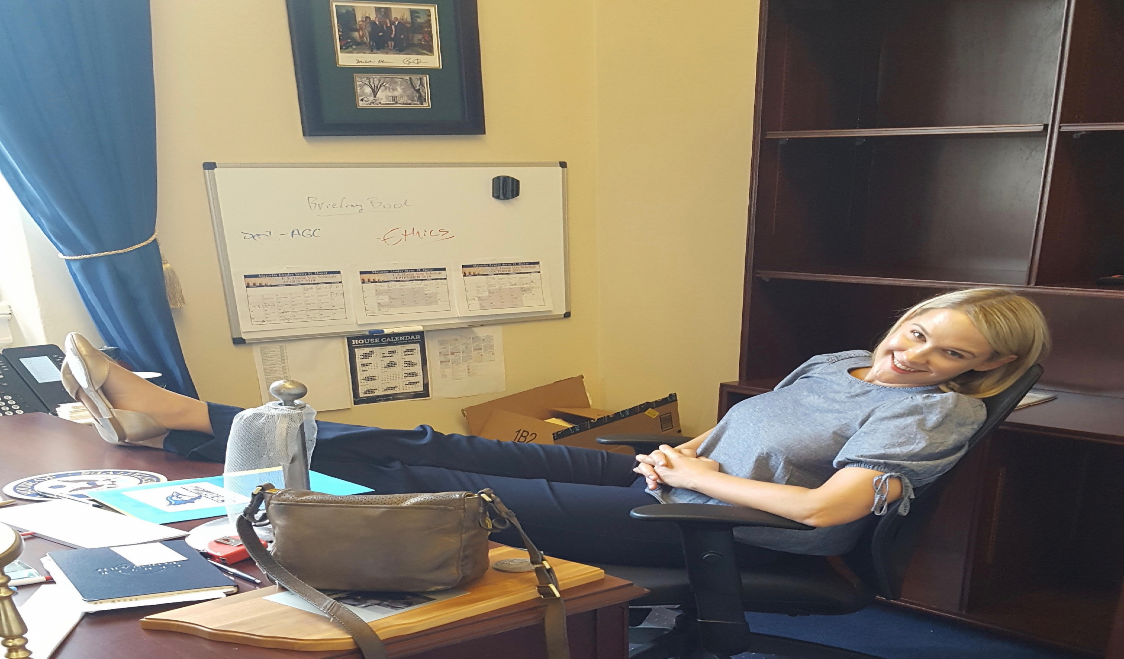The morning after the US Capitol was attacked, I found myself sobbing in front of the TV. The red-hot fury I’d felt for 24 hours had instantaneously morphed into wholesale heart sickness.
On the phone with a friend that night, after I’d thought I’d pulled myself together, it caught me off guard once more. I started a sentence. I had trouble finishing it.
Once I did let myself feel the full pain of what happened, it opened a floodgate of memories I have at the Capitol. As I paged through this mental scrapbook, there was one face that kept popping up. Her words, too:
“I smile at folks as they come in. I like to be the face of the office, make people feel welcome.”
As the Director of Operations for Congressman Tom O’Halleran (D-AZ), Willa Prescott handled all of the financial administration, scheduling and logistics in his DC District Office. I met Willa just once, in May of 2017, and we spent less than an hour together. But I can still see her warm, infectious smile as if she were sitting right across from me.
Willa was 32 years old at the time. She had previously worked for a congressman from her home state of Nebraska. Now, four months into her tenure with O’Halleran, she loved her new job. That smile was real. And while Willa wasn’t naive about the hardball of politics, she beamed idealism:
“I really do feel like this is the people’s office. This office belongs to our constituents.”
Previous to this trip to DC, I’d spent time at the Capitol when I was managing the campaign of an incumbent Congresswoman, Melissa Bean (D-IL). I’d also spent time there in 2014-15 as I was researching and writing Unlock Congress.
On this visit, I had a documentary crew with me to interview a group of centrist members of Congress. I spoke with Democrats and Republicans, as well as their staff.
The subject of my interviews was the lack of competitive House elections, which is a huge reason why we have so few representatives who are eager to work with the opposing party.
Three of the House members I interviewed, Mike Quigley (D-IL), Charlie Dent (R-PA), and O’Halleran, were all part of an informal caucus called “Problem Solvers.” The group has 50 members, equally split by party. There are 385 other members of Congress.
The answers I received from the members were good enough. But in a way, Willa Prescott articulated the challenge better than any of them — while at the same time explaining what it meant for the O’Halleran staff:
“I think when you’re in a swing district that’s not an easy win, what I’ve noticed from office to office is that you are more responsive to constituents. And each vote really does matter because people are watching and paying attention. Any wrong move, any negative can be so easily used against you. So, it’s very important that everyone on the staff is diligent and responsive to constituents. We really are looking into each vote we take. It’s also important that everyone understands ethics in the office.”
While my work surrounding Congress over the last two decades has been mostly on the campaign and journalism side of the fence, I’ve gotten to know a great many folks who toil every day on the official side of Capitol Hill. In other words, the people who work for us.
From pages to high-level staff, at every age and from every state and background, these Americans made a decision to be employed by us. We choose their direct bosses at the ballot box and we pay all of their salaries. And have no doubt about it — they earn those government-signed checks. Spend a day in any congressional office and you’ll get a clear picture of what official public service looks like.
Staff work is done quietly and mostly behind the scenes. But it often makes all the difference. In fact, when the chambers were in a panic last Wednesday, it wasn’t legislators who secured the ballot boxes and calmly carried them to safety. Senator Jeff Merkley (D-OR) later told reporters: “If our capable floor staff hadn’t grabbed them, they would have been burned by the mob.”
It has now been one full week since we watched domestic terrorists lay violent siege to what is known throughout the world as the foremost symbol of democratic government. I can’t type a sentence about it without feeling that heat rise up again in my chest.
To be clear, I have been equally outraged as I marched and wrote about the unjustified, horrific killings and street violence America witnessed in 2020.
But there was something that felt viscerally different to me about the graphic images of insurrection we saw at the Capitol. I’m sure this is partly because of the time I’ve spent there, but it is also because that place is ours. If you’re an American, you have played a role in determining and funding the people and structures that comprise our government — whether you realize it or not. “The People’s House,” by definition, is us.
Willa Prescott was not in the Capitol last week. She recently took a job outside of Congress. But she was on the phone with her old colleagues throughout that terrifying afternoon. Her heart was on the Hill. All of ours were.
There’s one more thing Willa said in our 2017 interview that stuck in my brain. As I looked back over the transcript, I realized that my usually foggy memory recalled her words almost verbatim:
“I don’t think democracy works unless we have people who believe in it. Any small part I can play in building people’s trust, that’s a good way to spend your life.”
At this treacherous moment in American history, you might be skeptical of Willa’s words. They may sound Pollyannaish. Nevertheless, they’re true.
And if you saw her smile when she said it, you’d believe her, too.


